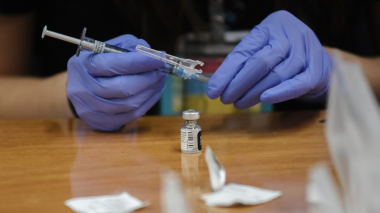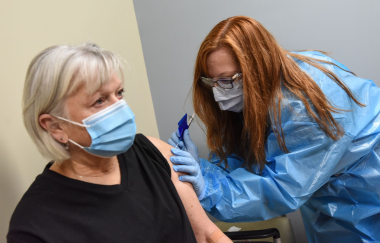What if there was a way you could help researchers learn more about coronavirus (COVID-19)? If you’re an Atrium Health patient or teammate, now you can participate in an innovative research study that asks people to report symptoms and, in some cases, administer home tests for coronavirus antibodies. These data will enable researchers to learn more about how the virus behaves in our community and affects persons uniquely, both now and in the future.
A few minutes of participants’ time can yield big results for researchers
The COVID-19 Community Research Partnership is a multi-center study that aims to collect information about the virus using online data gathering and at-home rapid diagnostic test kits that can test for COVID-19 antibodies (proteins that help fight off infections). Those who participate in the study will be asked to report daily on any COVID-19-related symptoms they have using a smartphone, computer, or tablet – a quick process that only takes less than 2 minutes.
Some study participants will also be asked to test themselves for COVID-19 antibodies using a simple, at-home blood test kit that is similar to the home tests used for diabetes. These tests will be able to determine whether a person has had a previous infection of a virus like COVID-19. When the body fights an infection, it makes antibodies, and the body develops an immunity to the virus (the same thing happens when you get a vaccine, like a flu shot).
Study participants will also be asked to complete short online questionnaires over several months about possible exposures, symptoms, and any health care visits related to coronavirus.
“Our hope is that data from this study will fill a critical gap in geographical mapping and projection modeling to help us picture what the future of COVID-19 will look like – not only in our region and state, but across the country,” says Eugene A. Woods, President and Chief Executive Officer of Atrium Health.
A multi-institutional effort
Atrium Health was invited to participate in the COVID-19 Community Research Partnership by Wake Forest Baptist Health, a nationally recognized academic medical center and health system based in Winston-Salem, N.C. and trusted partner of Atrium Health. A multidisciplinary team of more than twenty people was quickly convened at Atrium Health to ensure that all necessary regulations and protocols would be met.
In addition to Atrium Health and Wake Forest Baptist Health, numerous other healthcare are currently working hard to join the effort.
“So many institutions are interested in doing this type of work, and it made sense for us to partner with each other to make this study happen quickly and make it happen on a large scale,” says Michael Runyon, MD, MPH, professor of emergency medicine and principal investigator of the COVID-19 Community Research Partnership. “We want to get as many people as possible enrolled so we can gather information on symptom progression and can characterize the evolution of the pandemic. We really appreciate people signing up for the study – for folks looking to help, it’s a great way to contribute to the efforts to eradicate COVID-19.”
How it works
The COVID-19 Community Research Partnership was designed not only to ask participants to track their symptoms, such as fever or cough, but also to quantify those symptoms – for example, to input data on how high their fever is. Healthcare workers can input information on whether they were exposed to COVID-19 and whether they were wearing PPE at the time of exposure. If people visit a doctor for COVID-19 symptoms or are hospitalized, that data is also tracked in the study.
“By linking all of these data points together in one comprehensive study we’ll get a better understanding of the progression of the pandemic,” explains Dr. Runyon.
Plus, the way the study was designed makes it easy for people to provide this data using a computer, tablet, or smartphone.
For study participants who are asked to complete home testing for antibodies, they will be asked to test for antibodies every other month throughout the year-long study. Participants will use a finger-stick test to collect a drop of blood and will either send a photo of the test stick using a smartphone or will use a return mailer to send the test kit through the mail.
The research team will be able to see if people who initially didn’t have antibodies develop them later, or if those with antibodies go on to develop symptoms after a possible secondary exposure to the virus.
Tracking data
“Syndromic surveillance [the tracking of syndromes for a particular disease] has been used to study other diseases successfully in the past,” says Michael Gibbs, MD, interim vice president of research and professor and chair of emergency medicine and co-investigator of the COVID-19 Community Research Partnership. “And with the COVID-19 Community Research Partnership, the collection of these data will allow us to perform geographic mapping in real time.”
In several countries around the world, it’s been found that early tracking of coronavirus led to measures that helped significantly reduce its spread, and this type of information could be similarly useful in the U.S.
“Our intent is to gather a widespread sample across a particular geography to better understand the prevalence of COVID-19,” says Lewis McCurdy, MD specialty director for infectious disease and co-principal investigator of the study. “Between Atrium Health and Wake Forest Baptist Health, we’re covering central and western North Carolina. Each institution has oversight in counties where we have a clinical presence.”
As far as the value of collecting data on antibody testing, Dr. McCurdy says, “We are trying to learn whether there’s some variability in when people develop antibodies after exposure to COVID-19, how long the antibody lasts, and how protective it is. Using symptom monitoring and antibody testing together will be really informative. We’ll also be able to learn about COVID-19 in different patient demographics and in those with other underlying health conditions. We can look at different populations (such as the African American community, which is disproportionately affected by the virus) and see how they respond to the disease and how antibodies develop and sustain.”
Atrium Health study leaders have made the important decision to deliberately enroll sections of our community who are disproportionally impacted by the COVID pandemic, i.e.: African Americans, Hispanics, and those living in poverty. Our teams will work closely with these communities to encourage and facilitate study participation.
The COVID-19 Community Research Partnership is being funded by the state of North Carolina as well as the Centers for Disease Control and Prevention (CDC), and the national data registry is operated and maintained by Oracle™.
There is no cost to participate in the study.
Learn More about the COVID-19 Community Research Partnership
Stay informed with all of Atrium Health’s latest coronavirus updates



